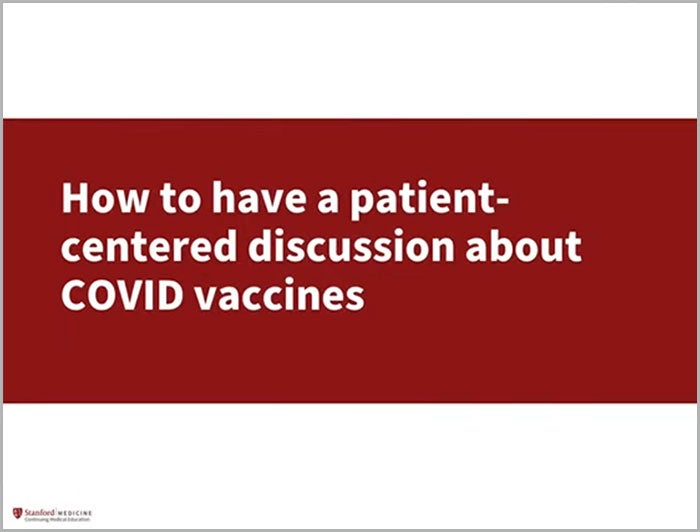Personalizing Conversations to Increase Uptake of COVID-19 Vaccines and Boosters

Since COVID-19 vaccines have become available, the percentage of vaccinated Americans has increased, yet the number of people who oppose vaccination with an “only if required” or “definitely not” attitude has held steady.
A recent research study identified seven distinct vaccine-related mindsets, or personas: 1) steadfast opponent, 2) healthy independent, 3) concerned skeptic, 4) indifferent individual, 5) cautious supporter, 6) reluctant vaxer and 7) vaccine advocate. Recognizing these different attitudes and applying person-centered communication strategies can guide health care providers’ conversations with patients about COVID-19 vaccines.
These seven personas are featured in an online course, “How to have a patient-centered discussion about COVID-19 vaccines,” designed by the Stanford Center for Continuing Medical Education. The online modules are based on “Human-centered Recommendations for Increasing Vaccine Uptake” by Kaiser Permanente, California Department of Health and California Coronavirus Testing Task Force.
Brief, about-two-minute animated videos in the course describe each persona and customized communication strategies. For patients who are strongly opposed to getting a COVID-19 vaccine, the emphasis is on, first, asking for permission to discuss the topic — followed by listening, rolling with resistance and legitimizing concerns. For those who are reluctant to get vaccinated, the same strategies apply along with emphasizing feelings of safety, planning for follow-up and facilitating logistics as needed.
The videos model how health care professionals can listen carefully to patients’ beliefs and concerns about COVID-19 vaccines and then answer their questions by sharing vaccine facts, the social benefits of vaccination, anecdotes and/or motivational stories, depending on the person. Using motivational interviewing and the PEARLS — partnership, empathy, acknowledgment, respect, legitimization and/or support — active listening strategy is recommended.
The “immediate measure of success” for most of these COVID-19 vaccine conversations is not “needle to arm,” the course emphasizes. “Changing vaccine mindset for those least motivated to receive the vaccine would require long-term investment. Rather the goal is to apply patient-centered communication strategies when encountering resistance to change.”
View the online course.

